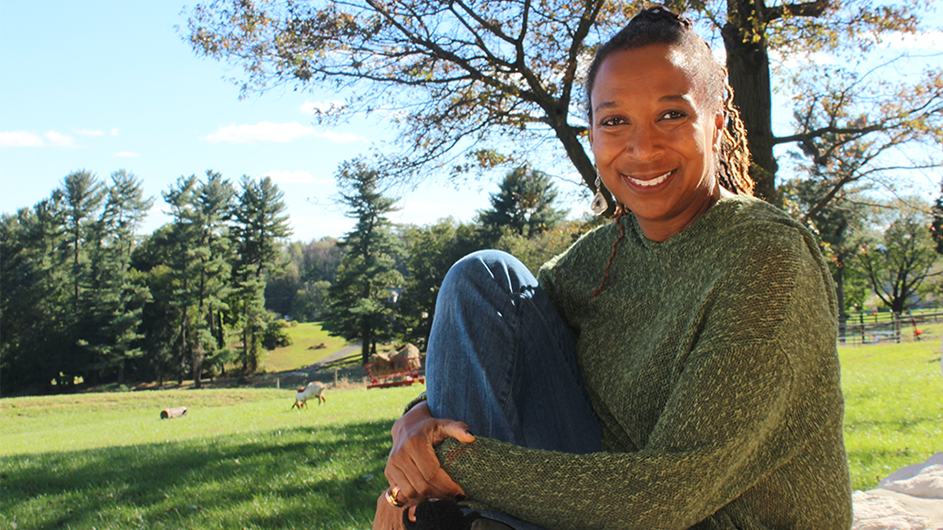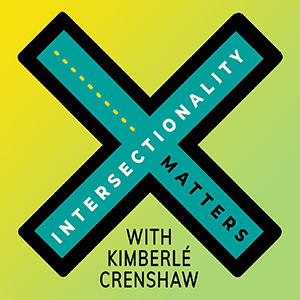What Does Intersectionality Mean in 2021? Kimberlé Crenshaw’s Podcast Is A Must-Listen Way to Learn
As Intersectionality Matters! enters its third season, Columbia News checks in with Kimberlé Crenshaw on why it is more important than ever.

It shouldn’t come as a surprise that the woman who coined the concept of intersectionality produces the foremost podcast on the subject matter, Intersectionality Matters!
A mixture of one-on-one interviews and group discussions, the podcast got its start in the days after the 2016 U.S. presidential election, giving Columbia Law Professor Kimberlé Crenshaw the chance to fully explicate and illuminate the oft-misunderstood concept of intersectionality, a groundbreaking framework that shows the nature of race, class, and gender as interdependent systems of discrimination and disadvantage.
Today, Crenshaw says, the parsing of intersectionality may be more important than ever. “We had the greatest conflagration in American history over the desire of one part of the country to destroy the union because their racial way of life was being challenged. And we never really fixed that. So now, here we are, Black History 2021. And the continuing cancer almost took out the body. So February is a good time to really think very hard about what its implications are for higher education, for public discourse, for civil society.”
Produced with a small team comprised of Julia Sharpe-Levine and the researchers at the African American Policy Forum, and led by host Crenshaw, episodes feature household names, such as Black Lives Matter co-founder Alicia Garza and Pulitzer-Prize Winning author Viet Thanh Nguyen, as well as a slew of other prominent authors and thought leaders. It regularly pulls more than 50,000 listeners per episode and has a nearly five-star rating on Apple podcasts.
“It's really satisfying to know that there are listeners who understand that the short sound bites and the 140 characters can distort as much as they inform,” Crenshaw says. “The idea that people are willing to sit through sometimes 90 minutes, they're really engaged. Intersectionality is not just an abstract idea. It's a way of seeing and engaging and we have to really perform it for people to understand it.”
Now heading into its third season, Intersectionality Matters has evolved, and Columbia News caught up with Crenshaw to learn more about episodes that touched her, how the podcast might change under the Biden-Harris administration, and exactly what intersectionality means in 2021.
Q: Does the podcast give you a chance to talk about your own experience with intersectionality more than you have in the past?
A: Some of my favorite episodes are those that got into the memoir-ish dimension of intersectionality. I did an interview with Tracee Ellis Ross (Episode 7. Defending the C.R.O.W.N.: Life, Liberty, and the Pursuit of Nappyness), where she was talking about the challenges of Black women's hair. We were talking about The CROWN Act, which finally provides protection to Black women who have lost jobs because of hair discrimination. We were just in the conversation and, before I knew it, I was telling the story about my own childhood and a mistake that my father made one day in allowing me to get my hair wet and what a catastrophe that had created the next morning.
Related Content
Her response to that story and the way it fueled our conversation was really eye-opening because I hadn't talked a lot about intersectionality from my own lived experience. The conversation just naturally opened up into that. Now I'm doing a book for Simon and Schuster that is an intersectionality, sort of, memoir-manifesto. I think the curation of that voice actually came from doing the podcast.
Q: What are you hoping people will take away when they listen?
A: Since intersectionality got popular, there are critics who frame it as simply an “identity sweepstakes.” And some of it is kind of funny, actually, because it is such a distortion. People say that you just count up how many identities you have, and voilà, here's your intersectionality score. That gives the impression that everyone has a score and it's their intersectionality badge and it says the same thing throughout time and across institutions, time, and space. That's actually kind of the opposite of what intersectionality is really about.
Intersectionality is about capturing dynamics and converging patterns of advantage and disadvantage. Those are going to change from context to context.
Intersectionality is about capturing dynamics and converging patterns of advantage and disadvantage. Those are going to change from context to context. Our way of thinking about what discrimination looks like is flattened, and it says, race discrimination is the same for everyone. We're thinking Black women experience racism the same way Black men do or that Latinas experienced sexism the same way that white women do, but there are millions of different ways that power converges. We're telling some of those stories to disrupt the false assumption that there is only one story, or a couple, and that intersectionality is just a number. It's not a number. It's a set of experiences. The podcast tries to tell those experiences.
Q: Are there specific episodes that a first-time listener should jump into? What are your favorite episodes?
A: Episode 6: What Slavery Engendered: An Intersectional Look at 1619
We did a podcast and it was an intersectional look at 1619. The 1619 Project is phenomenal. It retells and rethinks what it would mean to narrativize the American story from the arrival of the first Africans who were imported, telling the story from slavery forward, as opposed to 1776. But rather than just talking about 1619, we were explicitly intersectional. We talked about 1619 from the perspective of the breeding of Black women, which ultimately is what slavery became. What are the ideologies around women that needed to be disrupted and racialized to justify what was being done to Black women? What are the stereotypes that that ideology engenders? And how have those stereotypes not been fully disrupted?
Episode 1: A Mother's Nightmare: The Life and Death of Korryn Gaines
Another episode I loved was one of the first episodes that we did about #SayHerName. I talked to Rhanda Dormeus about the killing of her 23-year-old daughter Korryn Gaines. First of all, so many aspects of the media coverage of what happens to black women just falls between the cracks. Even I didn't know that Rhanda’s daughter had wound up in the crosshairs of law enforcement, basically over traffic citations. It was such a moving episode. I had talked to Rhanda many, many times before, but this time, we actually went in-depth and the intimacy of the episode opened us both up. The fact that Rhanda trusted me to tell that story in all of its heart-wrenching detail, and that telling that story was advancing why we needed #SayHerName, that really convinced us that there is a role for this kind of engagement with intersectionality.
Q: The genesis of this podcast came in response to the Trump presidency. Now that there is a new administration, how do you feel the podcast will change?
A: I think there will be a constant need to provide a prism for reading. If there is a honeymoon, I suspect it will be short. And that's a big “if” there. And let's be clear, Trumpism is not going away. Nor are the various ways that Trumpism distorts racial justice, gender, justice, and all other, you know, forms of social equity discourse, across many different -isms. So there will be many things that will continue to rise to the level of we-need-to-be-able-to-read-that-through-this-lens.
Q. What does intersectionality mean to you in 2021?
A: Well, I have to preface it by saying that with the executive order to dissolve the 1776 commission that President Biden signed, intersectionality is now a legitimate idea again to be discussed in the federal government. In September, intersectionality was an idea non grata, along with critical race theory and implicit bias and structural racism. When an idea gets to a point that a government decides that they have to call it out, to discredit it, that is telling me that there is power in it. There is huge value in it.
The one thing that Trumpism taught us is nothing is just there, not even the Republic, not even democracy. Everything is up for grabs. That means that we have to stabilize and nurture every idea that's important to us.
We saw what happened when people allowed lies about an election to go unaddressed. Imagine what happens when we allow ideas about social justice to go undefended?
And so, for me in 2021, intersectionality is the call to recognize that everything is contingent, even the ability to say these words. They have brought the fight to us. And we cannot fail to answer that. We cannot fail to stand up to it. We saw what happened when people allowed lies about an election to go unaddressed. Imagine what happens when we allow ideas about social justice to go undefended?
Q: It's Black History Month. Thinking about critical race theory and intersectionality’s contributions to history, do you have suggestions for how we can mark that this year?
A: Intersectionality and critical race theory are lenses that are forged in Black history, and build on that history, the history of how race and racism has been structured into our society, into our law, into our very institutions. I would say Black History Month is an opportunity to really grapple with what white supremacy has to do with our country nearing the edge of collapse. And, frankly, how reunion without justice is the name of the disorder that affects us still.
